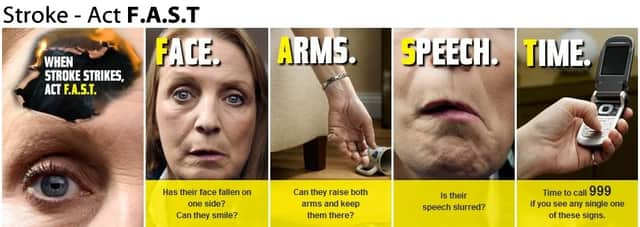HEALTH & WELLBEING: Know the signs of stroke


A stroke is a ‘brain attack’ caused by a disturbance of the blood supply to the brain.
It's a medical emergency that requires immediate medical attention, so recognising the signs of stroke and calling 999 for an ambulance is crucial. The sooner somebody who is having a stroke gets urgent medical attention, the better their chances of a good recovery.
Advertisement
Hide AdAdvertisement
Hide AdF.A.S.T. or Face-Arms-Speech-Time is easy to remember and will help you to recognise if you or someone else is having a stroke.
Face – has their face fallen on one side? Can they smile?
Arms – can they raise both arms and keep them there?
Speech – is their speech slurred?
Time to call 999 if you see any single one of these signs of a stroke.
There are also other symptoms that may occasionally be due to stroke. They include:
- Sudden loss of vision or blurred vision in one or both eyes
- Sudden weakness or numbness on one side of your body (including your leg)
- Sudden memory loss or confusion
- Sudden dizziness, unsteadiness or a sudden fall, especially with any of the other symptoms
You can take some simple actions to help reduce your chances of having a stroke. Some people are more at risk of having a stroke if they also have certain medical conditions, including:
Advertisement
Hide AdAdvertisement
Hide Ad- High blood pressure
- High cholesterol
- Atrial fibrillation (an irregular heartbeat)
- Diabetes
It is important that these conditions are carefully monitored and treated to reduce your chance of having a stroke. The risk of having a stroke is higher among people in certain ethnic groups, including South Asian, African and Caribbean. This is partly because high blood pressure and diabetes are more common in these groups. There are also lifestyle factors that may significantly increase the risk of having a stroke. They include:
- Smoking
- Being overweight
- Lack of exercise
- Poor diet
- Excessive alcohol consumption
- Leading a healthy, active lifestyle is vital to help reduce your risk of having a stroke.
Sue Cassin, Chief Nurses at Rotherham CCG advises… Be Clear on Breast Cancer
BRRR it’s still cold with very changeable weather as we look forward to Spring, don’t forget to check on any elderly and vulnerable relatives or neighbours.
Let’s take stock and look at how we can help ourselves and others. Talking about cancer sometimes feels scary and we avoid it but talking about it is the best way to raise awareness.
Advertisement
Hide AdAdvertisement
Hide AdThe Be Clear on Cancer “breast cancer in women over 70” campaign runs from February 22 up to the March 31 this year. The NHS will be spreading the word about this and championing its importance.
Although the number of people dying from breast cancer is falling there is still more that we can do to make people aware of the signs and what you should do if you spot any changes in your breasts. To improve survival rates in older women with cancer we need to promote and improve early diagnosis. Finding breast cancer early makes it more treatable. Research shows that women over 70 have low awareness of breast cancer symptoms, other than a lump. We recognise the Be Clear on Cancer campaign as being crucial in ensuring that women and particularly those over 70 are aware of the symptoms of breast cancer and are diagnosed early. One in three women who get breast cancer are over 70 so don’t assume you’re past it! Remember that a lump isn’t the only sign, you should tell your doctor if you notice any changes in your breasts. “Be Breast Aware”, there’s no special technique and you don’t need training to check your breasts. Everyone’s breasts are different so get know how your breasts look and feel normally as this will make it easier to spot any changes or anything different. While a lump is the most common sign of breast cancer, some symptoms can be seen rather than felt. Remember to check the whole breast area, including your upper chest and armpits.
If you spot any changes to your breasts, make sure you get checked by your doctor as soon as possible. Over the coming month you will see posters, leaflets, advertising on TV, in the press and on social media.
Let’s not forget our men as they can also get breast cancer and may not routinely notice changes early due to having only a small amount of breast tissue. Be clear - see your GP without delay if you notice any changes in your breasts, you can also talk to your practice nurse.